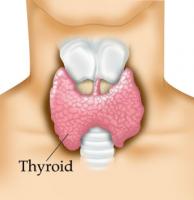Is my thyroid causing fatigue, hair loss?
03 Jun 2010, by in HAIR LOSS HEALTH NEWS
Is my thyroid causing fatigue, hair loss?

Asked by Christie, Arizona
“I was diagnosed with a slightly slower thyroid about a year ago when I was on the Atkins diet. I went off the diet, gained back the weight and now I am having the hardest time losing it again. My hair is half its usual thickness and I am tired all the time. Can this be from my thyroid?”

Conditions Expert
Dr. Otis Brawley
Chief Medical Officer,
American Cancer Society
Expert answer
Given your symptoms, I am concerned that you might have hypothyroidism. This is a condition in which the thyroid does not secrete enough hormone. I would recommend that you consult an internal medicine specialist or an endocrinologist and discuss your concerns. It is sometimes appropriate to simply monitor a slightly hypoactive thyroid, but most hypoactive thyroids eventually need treatment.
The thyroid gland is located in the front of the neck. It secretes thyroid hormone, which controls our rate of metabolism. Someone who has a hyperactive thyroid has a gland that is secreting too much hormone. They are hyperactive. They will have weight loss. Thinning of hair is common, but hair loss is uncommon. These patients have a faster heart rate and sometimes even a slightly higher temperature and sweating. People with very bad hyperactive thyroids will have a prominent bulging of the eyes and difficulty sleeping. They will initially be treated with beta blockers to slow metabolism and then will be treated with drugs to block thyroid secretion. Radioactive iodine is sometimes given to destroy the hyperactive thyroid. Surgical removal is also sometimes a treatment option.
People who have no thyroid gland or hypoactive thyroids (thyroids that produce too little thyroid hormone) have a generalized slowing of the metabolic processes. They are fatigued, can have slow movement and slow speech. They have a slow heart rate, are cold intolerant, can have constipation and often have weight gain. These patients have skin that is cool and pale because of decreased blood flow. Hair may be coarse. Hair loss is common, and the nails become brittle. Anemia is also common. The voice can deepen.
Hypothyroidism is common in adults and is usually due to an autoimmune disorder in which the patient’s immune system damages or destroys the thyroid. Iodine deficiency is a common cause of hypothyroidism in some countries in which foods are not fortified with iodine. A few people have hypothyroidism because of ingestion of radioactive iodine after nuclear accidents. Radioactive iodine in high dose can destroy the thyroid.
In the U.S. and Western Europe, hypothyroidism may occur in up to one in 25 adults with more than half being unaware that they are hypothyroid. It is often not diagnosed, although the diagnosis can usually be done through some widely available simple blood tests.
Treatment of hypothyroidism involves thyroid replacement through administration of oral medication. Synthetic thyroxine given once a day is the most common replacement drug. It is monitored through blood tests and the proper dose is created for each patient.
Do you have Hair Loss Problems, read our Hair Loss Help






Sorry, the comment form is closed at this time.